Background
Axel Honneth was born on July 18, 1949, in Essen, Germany. He is a son of Horst and Annemarie (Rahm) Honneth.
2015
Seminar with Axel Honneth on his last book “Freedom’s Right: The Social Foundations of Democratic Life”.
2017
Axel Honneth at the conference "Debats del Magnànim".
2018
Nicolson St, Edinburgh EH8 9DW, United Kingdom
Axel Honneth spoke on Recognition in Modern Europe at the Royal College of Surgeons of Edinburgh.
Regina-Pacis-Weg 3, 53113 Bonn, Germany
The University of Bonn where Axel Honneth studied.
Universitätsstraße 150, 44801 Bochum, Germany
The Ruhr-University, Main Lecture Hall, where Axel Honneth received a Master of Arts degree.
Kaiserswerther Str. 16-18, 14195 Berlin, Germany
The Free University of Berlin where Axel Honneth received a doctor of Philosophy degree.
Axel Honneth with the Ulysses Medal that he received in 2016.









(This work applies itself to a critique of Marxian theory,...)
This work applies itself to a critique of Marxian theory, which is especially sensitive to issues in the new social movements, ecological and feminist. The work of writers such as Gehlen and Plessner, and that of three historical anthropologists is discussed.
https://www.amazon.com/Social-Action-Human-Nature-Honneth/dp/0521339359/?tag=2022091-20
1988
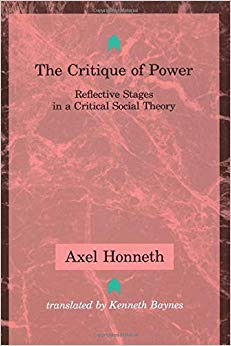
(In this rich interpretation of the history of critical th...)
In this rich interpretation of the history of critical theory, Axel Hormeth clarifies critical theory's central problems and emphasizes the social factors that should provide it with a normative and practical orientation.
https://www.amazon.com/Critique-Power-Reflective-Critical-Contemporary/dp/0262581280/?tag=2022091-20
1991
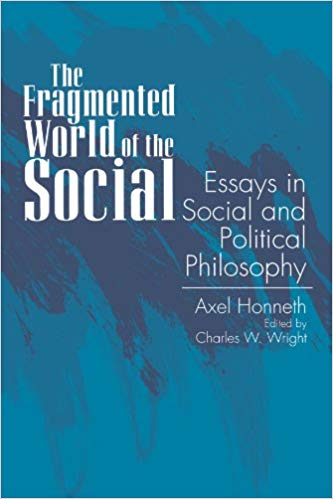
(The essays in this book weave together insights and argum...)
The essays in this book weave together insights and arguments from such diverse traditions as German critical theory, French philosophy and social theory, and recent Anglo-American moral and political theory, offering a unique approach to the political and theoretical consequences of the modernism/postmodernism discussion. Through an analysis of central themes in classical Marxism and early critical theory, the author shows how recent work in a variety of traditions converges on the need to question familiar distinctions between material production and culture, the public and the private, and the political and the social, and to reconsider the conceptions of agency and power that have informed them.
https://www.amazon.com/Fragmented-World-Social-Political-Philosophy/dp/079142300X/?tag=2022091-20
1995
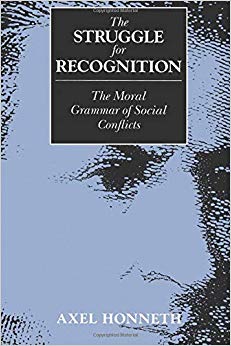
(In this pathbreaking study, Axel Honneth argues that "the...)
In this pathbreaking study, Axel Honneth argues that "the struggle for recognition" is, and should be, at the center of social conflicts. Moving smoothly between moral philosophy and social theory, Honneth offers insights into such issues as the social forms of recognition and nonrecognition, the moral basis of interaction in human conflicts, the relation between the recognition model and conceptions of modernity, the normative basis of social theory, and the possibility of mediating between Hegel and Kant.
https://www.amazon.com/Struggle-Recognition-Grammar-Conflicts-Contemporary/dp/0262581477/?tag=2022091-20
1995
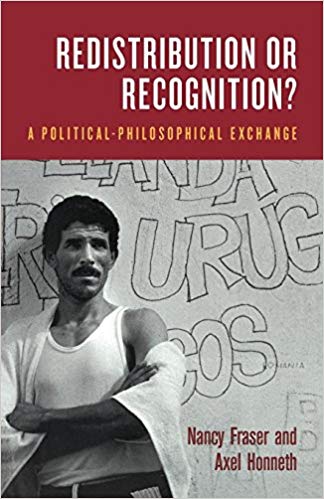
(This volume stages a debate between two philosophers, one...)
This volume stages a debate between two philosophers, one North American, the other German, who hold different views of the relation of redistribution to recognition. Axel Honneth conceives recognition as the fundamental, over-arching moral category, potentially encompassing redistribution, while Nancy Fraser argues that the two categories are both fundamental and mutually irreducible. In alternating chapters the authors respond to each other’s criticisms, and offer a lively dialogue on identity politics, capitalism and social justice. The volume is a dramatic riposte to those who proclaim the death of ‘grand theory.’
https://www.amazon.com/Redistribution-Recognition-Political-Philosophical-Nancy-Fraser/dp/1859844928/?tag=2022091-20
2003
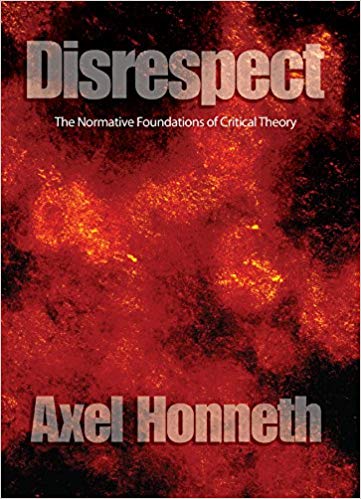
(In this volume, Honneth pursues his path-breaking work on...)
In this volume, Honneth pursues his path-breaking work on recognition by exploring the moral experiences of disrespect that underpin the conduct of social and political critique. What we might conceive of as a striving for social recognition initially appears in a negative form as the experience of humiliation or disrespect. Honneth argues that disrespect constitutes the systematic key to a comprehensive theory of recognition that seeks to clarify the sense in which institutionalized patterns of social recognition generate justified demands on the way subjects treat each other.
https://www.amazon.com/Disrespect-Normative-Foundations-Critical-Theory-ebook/dp/B00OMYZ9GU/?tag=2022091-20
2007

(Collected here for the first time in English, Honneth's e...)
Collected here for the first time in English, Honneth's essays pursue the unifying themes and theses that support the methodologies and thematics of critical social theory, and they address the possibilities of continuing this tradition through radically changed theoretical and social conditions. According to Honneth, there is a unity that underlies critical theory's multiple approaches: the way in which reason is both distorted and furthered in contemporary capitalist society. And while much is dead in the social and psychological doctrines of critical social theory, its central inquiries remain vitally relevant.
https://www.amazon.com/Pathologies-Reason-Legacy-Critical-Directions-dp-0231146264/dp/0231146264/?tag=2022091-20
2009

(This is a penetrating reinterpretation and defense of Heg...)
This is a penetrating reinterpretation and defense of Hegel's social theory as an alternative to reigning liberal notions of social justice. The eminent German philosopher Axel Honneth rereads Hegel's Philosophy of Right to show how it diagnoses the pathologies of the overcommitment to individual freedom that Honneth says underlies the ideas of Rawls and Habermas alike. Honneth argues that Hegel's theory contains an account of the psychological damage caused by placing too much emphasis on personal and moral freedom.
https://www.amazon.com/Pathologies-Individual-Freedom-Monographs-Philosophy/dp/069111806X/?tag=2022091-20
2010
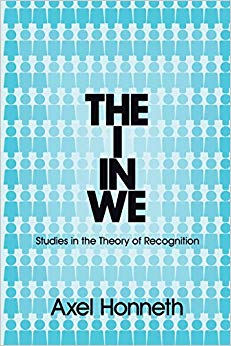
(In this volume Axel Honneth deepens and develops his high...)
In this volume Axel Honneth deepens and develops his highly influential theory of recognition, showing how it enables us both to rethink the concept of justice and to offer a compelling account of the relationship between social reproduction and individual identity formation.
https://www.amazon.com/We-Studies-Theory-Recognition/dp/0745652336/?tag=2022091-20
2012

(Theories of justice often fixate on purely normative, abs...)
Theories of justice often fixate on purely normative, abstract principles unrelated to real-world situations. The philosopher and theorist Axel Honneth addresses this disconnect, and constructs a theory of justice derived from the normative claims of Western liberal-democratic societies and anchored in morally legitimate laws and institutionally established practices.
https://www.amazon.com/Freedoms-Right-Foundations-Democratic-Directions/dp/0231162472/?tag=2022091-20
2014

(In this lucid, political-philosophical essay, Axel Honnet...)
In this lucid, political-philosophical essay, Axel Honneth argues that the idea of socialism has lost its luster because its theoretical assumptions stem from the industrial era and are no longer convincing in our contemporary post-industrial societies. Only if we manage to replace these assumptions with a concept of history and society that corresponds to our current experiences will we be able to restore confidence in a project whose fundamental idea remains as relevant today as it was a century ago the idea of an economy that realizes freedom in solidarity.
https://www.amazon.com/Idea-Socialism-Towards-Renewal/dp/1509531378/?tag=2022091-20
2016
Axel Honneth was born on July 18, 1949, in Essen, Germany. He is a son of Horst and Annemarie (Rahm) Honneth.
Axel Honneth studied at the University of Bonn and the Ruhr-University from 1969 to 1974. He received a Master of Arts degree from Ruhr-University in 1974. Honneth also attended the Free University of Berlin where he received a Doctor of Philosophy degree in 1983.
Axel Honneth started his career as a research assistant at the Institute of Sociology of the Free University of Berlin in 1977. He held this post until 1983 when he became a university assistant at Goethe University Frankfurt. From 1991 to 1992 Honneth served as a Professor of Political Philosophy at the University of Konstanz. In 1992, he took up a post of a Professor of Political Philosophy at Otto Suhr Institute of Political Science. He left this post in 1996.
Honneth worked as Theodor Heuss guest professor at The New School from September 1995 to April 1996. In 1996, he became a professor at Goethe University Frankfurt where he worked until 2015. From 2001 to 2018 Honneth served as Managing Director at the University of Frankfurt Institute for Social Research. Since 2011, he is Jack C. Weinstein Professor of the Humanities in the department of philosophy at Columbia University.
Axel Honneth wrote books about social-political and moral philosophy. His first book was Social Action and Human Nature. Later he published such books as The Fragmented World of the Social, The I in We and The Struggle for Recognition. His latest book The Idea of Socialism was published in 2016. Honneth is a co-editor of numerous journals such as the German Journal of Philosophy, the European Journal of Philosophy and the journal Constellations.
Axel Honneth is a German philosopher, educator and writer who is famous for his books about social philosophy. His most famous books are The Struggle for Recognition and Freedom's Right.
Axel Honneth received the Ernst Bloch Prize in 2015. In 2016, he received the Bruno Kreisky Prize for Services to Human Rights and the Ulysses Medal.
(The essays in this book weave together insights and argum...)
1995(Collected here for the first time in English, Honneth's e...)
2009(In this volume Axel Honneth deepens and develops his high...)
2012(In this lucid, political-philosophical essay, Axel Honnet...)
2016(In this rich interpretation of the history of critical th...)
1991(In this volume, Honneth pursues his path-breaking work on...)
2007(This volume stages a debate between two philosophers, one...)
2003(This work applies itself to a critique of Marxian theory,...)
1988(This is a penetrating reinterpretation and defense of Heg...)
2010(In this pathbreaking study, Axel Honneth argues that "the...)
1995(Theories of justice often fixate on purely normative, abs...)
2014Axel Honneth's field of research is social philosophy especially relations of power, recognition, and respect. He is the author of the theory of recognition. One of his core arguments is for the priority of intersubjective relationships of recognition in understanding social relations. He said that the basis of social and interpersonal conflict is non- and mis- recognition.
Honneth stated that a fair society is a society that guarantees its members the institutional and structural opportunity (though nonetheless irreducible to an objective division of social work) to be ethically realized. Honneth proposes a conception of social justice based on a "formal outline of the ethical life".
Quotations:
"It is all those moral deviations that constitute the developmental process of society and its relations of recognition. In every historical epoch, individual, particular anticipations of expanded recognition relations accumulate into a system of normative demands, and this, consequently, forces societal development as a whole to adapt to the process of progressive individuation. The process of development goes in the direction of ever-greater liberation of individuality, increasing personal autonomy."
"Social philosophy is primarily concerned with determining and discussing processes of social development that can be viewed as misdevelopments, disorders or "social pathologies."
Axel Honneth married Christine Pries on November 15, 1993. The marriage produced one child.
